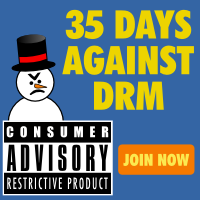by Mike Melanson of ReadWriteWeb.com
 In a battle that's been ongoing since the fall of 2007, Comcast just won the latest round against the Federal Communications Commission. A federal appeals court announced its decision this morning to grant ComCast a petition for review, vacating the order by the FCC, which imposed a "net neutrality" on the nation's largest cable company.
In a battle that's been ongoing since the fall of 2007, Comcast just won the latest round against the Federal Communications Commission. A federal appeals court announced its decision this morning to grant ComCast a petition for review, vacating the order by the FCC, which imposed a "net neutrality" on the nation's largest cable company.The decision appears to focus on the FCC's legal authority to enforce net neutrality and not on the legality of net neutrality itself.
The case began when "several subscribers to Comcast's high-speed Internet service discovered that the company was interfering with their use of peer-to-peer networking applications," the decision reads. Comcast argued that its move to block p2p file-sharing was "necessary to manage scarce network capacity", but the FCC found differently, ruling that the company had "significantly impeded consumers' ability to access the content and use the applications of their choice".READ THE FULL ARTICLE HERE
-----
Court: FCC had no right to sanction Comcast for P2P blocking
The FCC's decision to sanction Comcast for its 2007 P2P blocking was overruled today by the US Court of Appeals for the DC Circuit. The question before the court was whether the FCC had the legal authority to "regulate an Internet service provider's network management practice." According to a three-judge panel, "the Commission has failed to make that showing" and the FCC's order against Comcast is tossed.
When the complaints against Comcast first surfaced, they noted that the company was violating the FCC's "Internet Policy Statement" drafted in 2005. That statement provided "four freedoms" to Internet users, including freedom from traffic discrimination apart from reasonable network management. The FCC decided that Comcast's actions had not been "reasonable network management," but Comcast took to the agency to court, arguing that the FCC had no right to regulate its network management practices at all.
The Internet Policy Statement was not a rule; instead, it was a set of guidelines, and even the statement admitted that the principles weren't legally enforceable. To sanction Comcast, the FCC relied on its "ancillary" jurisdiction to implement the authority that Congress gave it—but was this kind of network management ruling really within the FCC's remit?
The court held that it wasn't, that Congress had never given the agency the authority necessary to do this, and that the entire proceeding was illegitimate. The FCC's "Order" against Comcast is therefore vacated; Comcast wins.
READ THE FULL ARTICLE HERE
-----
Could Comcast Derail the National Broadband Plan?
By Ed Oswald of PCWorld.com
President Obama has made broadband a key part of his telecommunications agenda. To get there, he has tasked the Federal Communications Commission with the responsibility to make changes to Internet regulations and promote his "National Broadband Plan," an ambitious effort to reform the industry and expand broadband access across the country.
There's an elephant in the room however, and its name is Comcast. The telecommunications company is challenging the FCC's authority on Internet regulation in court, and if successful it could seriously inhibit the agency's efforts to move its plans forward. Comcast's beef goes back to 2008, when the FCC censured the company for its bandwidth-throttling efforts against BitTorrent and others.
READ THE FULL ARTICLE HERE
-----
FCC loses Comcast's court challenge, a major setback for agency on Internet policies
via WashingtonPost.com
Comcast on Tuesday won its federal lawsuit against the Federal Communications Commission in a ruling that undermines the agency's ability to regulate Internet service providers just as it unrolls a sweeping broadband agenda.
The decision also sparks pressing questions on how the agency will respond, with public interest groups advocating that the FCC attempt to move those services into a regulatory regime clearly under the agency's control.
The U.S. Court of Appeals for the District of Columbia, in a 3-0 decision, ruled that the FCC lacked the authority to require Comcast, the nation's biggest broadband services provider, to treat all Internet traffic equally on its network.
READ THE FULL ARTICLE HERE
-----
Comcast Can Block BitTorrent Again, Court Rules
by Ernesto of TorrentFreak.com
In 2008 Comcast was ordered to stop slowing down BitTorrent users by preventing them to share files with others. In addition, the company had to disclose all “network management” practices.
The whole Comcast debacle ignited a discussion about Net Neutrality and eventually led to the FCC’s national broadband plan which was released last month. Today, the Court of Appeals overruled FCC’s decision in the Comcast case, with three judges stating that the commission doesn’t have the authority to require IPSs to keep their network neutral.
After appealing FCC’s decision in favor of BitTorrent users, Comcast has finally got the verdict (pdf) it wanted. Although it seems unlikely that the ISP will pick up its old habit of preventing BitTorrent users to seed files, it could in theory do so.
READ THE FULL ARTICLE HERE








 Obama Embraces Creative Commons
Obama Embraces Creative Commons
